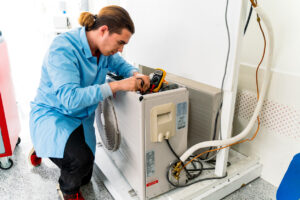Now is the time to get back some freedom as the kids head off to school once again. In the spirit of the back to school season, we want to spread some knowledge on a very underrated piece of equipment in our households. That piece of equipment is out HVAC systems.
Without our HVAC systems, we would not have any heat in the winter nor any cool air in the summer. Knowing how to maintain your HVAC, and know when to call for repairs can help you keep your system running at top-notch. Below, we are going to give you the basics on your heating and air conditioning, how it works, and what to do in an emergency.
How Your HVAC Works
In general terms, an HVAC system works by either heating or cooling the air around you using the energy source that you choose (gas, oil, electric). There are three different types of HVAC systems that we are going to look at.

- Forced Air Systems- A forces air system works by using a network of ducts to circulate the cool or hot air throughout your home. With a furnace, the air is brought to the heating device and heated, it is then pushed through the ducts to where it’s needed. There are two separate duct systems; one for cool air and one for hot.
- Gravity Systems- A gravity system works on the principle that hot air rises. So when you turn your thermostat up, the air is heated which then rises through the floor to heat your home. Gravity systems are always located on the lowest floor (usually the basement), and can not be used with an AC system.
- Radiant Systems- Radiant systems, like gravity systems, cannot be used with an AC unit. Radiant systems use heat in the floor or walls to heat the room by “radiating” the heat. Though newer technology uses heated coils in the floor and walls to heat a space, a room radiator works on the same principle.
How To Maintain Your HVAC System

A properly working HVAC system is only going to benefit from regular maintenance. Maintenance should be performed by a professional annually, but there are a few things you can do yourself to make sure your HVAC performs properly:
- Replace your air filters regularly.
- Clear any debris away from outside AC units
- Do a visual inspection to check for leaks, rust, and damage.
- Check to make sure your pilot light is blue.
All of these things will help extend the life of your HVAC and help you reduce the number of repairs.
HVAC Repairs And How To Spot The Signs
With every HVAC system, there will come a time when you need repairs. These repairs can be minor, and they can be costly. The quicker you are able to spot signs of trouble, the quicker you can have a service technician on-site so the problem does not get worse. Keep an eye out for these signs of repairs:

- Inconsistent heating or cooling.
- Pilot light that is not blue.
- Excess dust around your vents.
- Your HVAC is 10 years or older.
- Your thermostat is not responding.
- Installed incorrectly.
- Frequent breakdowns.
All of these should be a sign of concern and you should reach out to a professional for assistance immediately. Nice Heating and Air technicians are experienced in HVAC technology. We are available for repairs, maintenance, and installations. Give us a call today so we can answer all of your questions.
 SEE OUR SPECIALS
SEE OUR SPECIALS





 SCHEDULE SERVICE
SCHEDULE SERVICE Call 703-884-2376
Call 703-884-2376


